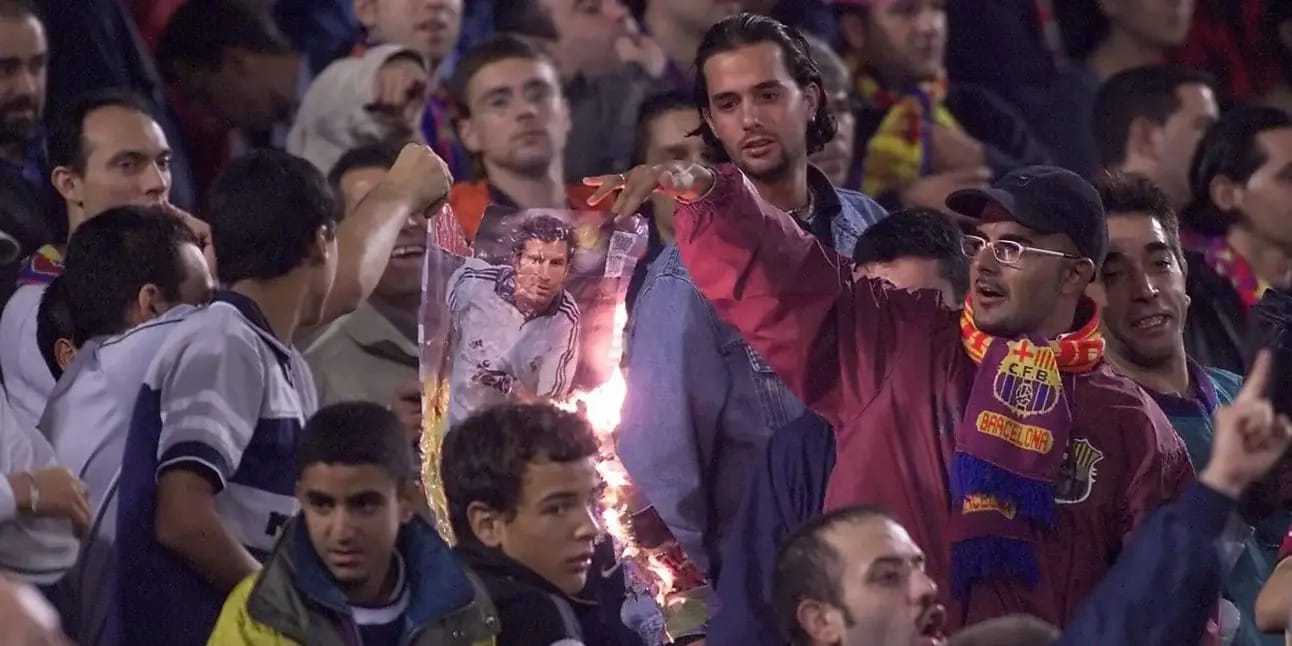
By Rory Smith
In the circumstances, the sound could not have been more fitting. It was complex and ambivalent, open to any and all interpretations. With every rendition, it took on a new shape, a new tone, a slightly altered emphasis. It was the sound of internal tension, a wordless dialogue that, somehow, spoke volumes. It was perfect.
As Trent Alexander-Arnold stood on the Anfield touchline in the 67th minute of Liverpool’s draw with Arsenal, everyone could hear what they wanted to hear. There were boos, deep and sonorous, picked up by the pitch-side microphones and beamed across the planet, the raw material for ever-churning content factories: proof of the fury Liverpool fans feel at the 26-year-old’s betrayal.
But there was also applause, arrhythmic and sharp, a defiant response to the bubbling fury. They were quieter, certainly initially, but perhaps that was to be expected. “Claps are not as loud as boos,” as Arne Slot, Alexander-Arnold’s soon-to-be-former manager and amateur sound engineer, said. They grew louder every time the right-back touched the ball, a call and response of rage and appreciation. Stadiums generally speak with one voice. This was Anfield polarized, uncertain, engaged in a full and frank exchange of views.
In the 10 days or so since he announced the blindingly obvious – that he would not be renewing his contract at Liverpool – plenty has been written on the rights and wrongs of Alexander-Arnold’s decision.
Some have defended his choice to explore new horizons, to seek new experiences, to taste what life is like outside the only club he has ever known. Others have decried him as something between a heretic and a traitor, a local boy and a childhood fan who has manipulated the club he professed to love for his own gain.
Liverpool fans have been told they should be more grateful for all that he has achieved at the club, that they do not have the right to tell him how to live his life, that it is not fair to hold him hostage to living out their dream. The counter-argument, no less convincing, is that Alexander-Arnold is free to do as he wishes, but freedom of movement is not quite the same as freedom from consequence.
Wherever you fall on that spectrum, it is hard not to feel that it could not be any other way. It would not be right, really, if anything Alexander-Arnold did was met with universal approval. It is only fitting that he leaves Liverpool the way he has spent the nine years of his senior career there: as the subject of intense and unending debate.
It would not be completely accurate to say that no footballer has been discussed more than Alexander-Arnold over the last decade. More words have, probably, been committed to print or broadcast into the atmosphere about Lionel Messi and Cristiano Ronaldo, particularly in relation to their relative merits. Harry Kane has never been short of discourse, or Vinicius Junior, or Kylian Mbappé.
But it is hard to think of one who has been quite as divisive as Alexander-Arnold. He will move to Real Madrid as a two-time Premier League champion. He has won the Champions League with Liverpool, and both domestic cups. He has created more goals than any right-back in modern English history; he can stake a claim to being the most creative defender England has ever produced.
And yet there has, even as he has racked up those assists and those medals, been a consistent drumbeat of doubt: not over his precise place in a hierarchy of greatness, whether he ranks above or below Kyle Walker or Kieran Tripper or whoever, but whether he is any good at all.
Alexander-Arnold is not unique in being assessed, obviously. He is hardly the only player who is criticized, or even the only one who is subject to a scrutiny that can feel excessive. But there has, for a long time, seemed to be a disconnect between how highly he is regarded by his admirers and how poorly by his detractors.
I have tried, a couple of times, to figure out why that might be. My absolutely scientific and in no way self-indulgent approach has identified a number of contributory factors, including but not limited to: playing for a high-profile club; playing in the same position occupied at one point by Gary Neville; having a skillset that English football does not immediately know how to categorize; possessing both strengths and weaknesses that can easily be captured on TikTok.
Mainly, though, I think Alexander-Arnold is genuinely interesting in a way that most players are not. It is possible both to take and, crucially, to defend a sincere and valid position on both sides of the debate he has always provoked.
He represents, as both Jürgen Klopp and Slot have said, a trade-off: managers and teammates and fans tolerate the things he does not do as well as he might because of all the things he does far better than anyone else in his position. But it is nonetheless legitimate to believe that exchange is not worth it, even if it does involve ignoring quite a lot of concrete evidence.
Soccer being soccer, of course, that debate has not always been had in good faith. There are plenty who have a vested interest in seeing the worst in Alexander-Arnold; I have wondered, for some time, whether at least part of the appeal of a move to Real Madrid is that he feels distance might help people see him rather more clearly.
Maybe that is how it will play out. Removed from the tribal biases of the Premier League, maybe he will discover a whole new constituency of Manchester City and Arsenal and Tottenham fans who suddenly realize that he is a player of remarkable gifts. Maybe, for the first time in his career, a consensus will coalesce around him. But that is for next season, next year. For now, there is only that sound, discordant and mercurial, the jeers and the applause, the endless debate that has accompanied him every step of the way and will be there, right until the end.
Enjoying this newsletter? Subscribe to the Raven to get more thoughts from Rory Smith in your inbox each week.
Some Transfers Hurt More than Others

In the grand scheme of things, Alexander-Arnold may have got off relatively lightly. When Roberto Baggio, the brilliant Italian playmaker, left Fiorentina for Juventus in 1990, there was a full-scale riot in the streets of Florence. The club’s ultras laid siege to the training facility, and the president had to barricade himself in the stadium. A few boos are not, in comparison, such a big deal.
Luis Figo, too, may not quite understand what all of the fuss is about. When he left Barcelona to join Real Madrid – a move that he has subsequently admitted he did not particularly want to make – countless replica jerseys were burned in the streets; when he returned, a few months later, it was under heavy police escort.
Some transfers, in other words, hurt more than others. Both Baggio and Figo were adjudged to have betrayed their teams by joining a hated rival. That they were leaving was bad enough. Where they were going was intolerable.
In the case of homegrown players, though, the betrayal is keener still. Those stars who grow up in a city, who come through a club’s academy, who play for their boyhood team are acting out the dream of all those fans who watch them, whether it is up close, in the stadium, or from afar, on television.
As we discussed on the podcast this week, the act of abandoning that dream is something that fans feel personally, viscerally. I wonder if that is not just because it breaks one of the cardinal rules of fandom – that it is not possible to switch allegiance – but because it shatters an illusion, too. We are all meant to believe that the players on the field cherish the jersey they are wearing as much as we do, as we would. When one of our own makes a decision with their head, rather than their heart, it forces us to confront an unappealing truth that the game is, in fact, rather more transactional than that.
Dining with the Stars

As for Alexander-Arnold’s future, there are plenty of unknowns. He has not yet, officially, signed for Real Madrid, of course, but even when that formality is completed we will not be sure where he is going to play under the club’s incoming manager, Xabi Alonso. We can’t be sure whether his arrival will help unlock the ongoing mystery of Vinicius and Kylian Mbappé.
But we can be absolutely certain that, at some point in his time in Madrid, he will eat in two restaurants. Meson Txistu is a Basque, fine-dining sort of a place in Chamartín, Real’s historic home neighborhood. It’s long been a favorite of the club’s players and, especially, its executives. I’ve been once, and I’ll admit that it is a bit formal, a bit heavy for me.
Far better is another Madridista institution: the Argentinean steakhouse De María. Going to De María after a Champions League game is a staple. It might, actually, be the best thing about the competition. The steak is, as you would expect, incredible. The provoleta is rich and moorish. And the patatas soufflé – a sort of mix between fries, chips, sautéed potatoes, and the joy a child might feel – are a masterpiece.
It’s worth getting a table facing the door: from about 1 am, there’s a pretty good chance that you’ll see at least one aging World Cup winner drifting in, followed in short order by a couple of Real Madrid players.
How do you feel about Trent being booed by the Liverpool faithful? What transfers do you still lay in bed at night thinking about? Where’s your favorite place to eat in Spain’s capital? Send Rory, and the full MiB team, your questions or thoughts at [email protected].
